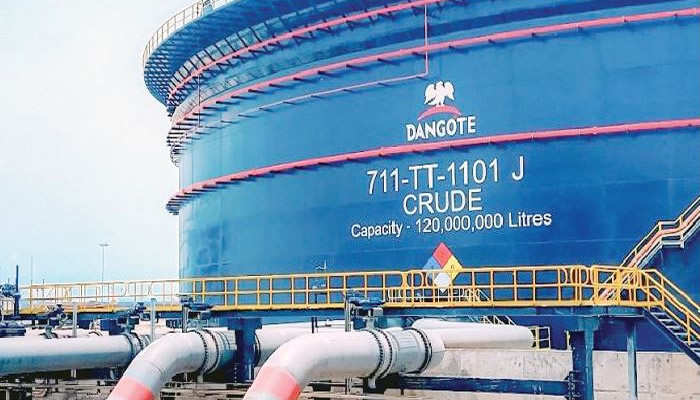Photo caption: Dangote Refinery
Reduced output from the Dangote Petroleum Refinery due to maintenance supported a bounce in West African import demand, as the market has reverted to European supplies to serve regional demand.
According to S&P Global Commodities at Sea data, gasoline imports to Nigeria and Togo surged from around 200,000 barrels per day in January to over 300,000 barrels per day in March, and roughly 250,000 b/d in April, close to Nigeria’s total of around 300,000 b/d of national demand.
The PUNCH recalls that the Dangote refinery had earlier denied shutting down its petrol-processing unit for maintenance.
S&P Global reports on Wednesday that the Dangote refinery is restarting its main gasoline unit, the residue fluid catalytic cracker, and is evaluating the need for a second turnaround, a company executive said.
A Dangote executive who reportedly spoke to Platts, part of S&P Global Commodity Insights, on May 13, was quoted as saying that the company is in the process of returning refining units from a four-week turnaround to address ‘design issues’.
It was stated that the refinery is ramping up its RFCC, alkylation, and polypropylene units, but the company is yet to determine whether a second maintenance will be necessary later this year.
“The real picture can be seen only when we open the equipment,” the source has noted.
It was said that output from the Lagos refinery has become a key barometer for global gasoline cracks since production began last year, and unplanned April maintenance supported a Eurobob price rally when roughly 100,000 b/d of supply was suddenly taken offline.
According to the refinery executive, the plant’s crude distillation unit was last running at 550,000 b/d, roughly 85 per cent of its nameplate capacity.
After starting test runs in Q3 2024, roughly nine months after the refinery was inaugurated, the RFCC had reached 70 per cent of its capacity before the outage, the executive was reported.
The company now plans to ramp up the unit to its full capacity, allowing the site to finally scale crude throughput at the refinery to the site’s full 650,000 barrels per day potential, he said.
With the RFCC offline, the refiner was forced to rely solely on its 120,000 bpd reformer to serve local gasoline demand in April.
Market sources were said to have reported restricted access to gasoline cargoes and LPG during the outage, but said May 12 that more supplies had been made available.
Other secondary units continued to operate uninterrupted during the works, and the refinery has maintained steady exports of gasoil, jet fuel, and residual fuel that would typically be processed in the RFCC.
The report added that before the unit was taken offline, Dangote officials were preparing for a month-long turnaround in June, though speculators said that the April turnaround may have pre-empted planned works.
The Dangote Group beat most analyst expectations by commissioning the RFCC and bringing its first gasoline to market in September 2024, but the unit has since suffered repeated outages in 2025, delaying expectations for its operations to stabilise.
According to forecasts by S&P Global Commodity Insights, a June RFCC turnaround at the refinery would support global gasoline cracks by roughly $3/b.
Import shifts to Lome
According to market sources, Togo has become an increasingly important channel for Nigerian imports as traders have drawn growing volumes to the offshore Lome market, where supplies are then loaded from large cargoes onto smaller vessels.
The trend to import supplies to Lome and breakbulk has been motivated by financial incentives to reduce tax exposure and continue purchases in US dollars, sources said, as the Nigerian government has made a push for companies to transact in naira.
Strong flows to West Africa have been aided by soft freight costs. Platts assessed the Clean Long-range UKC-West Africa rate at $22.68/mt on May 12, down from $28.25/mt the previous year.



